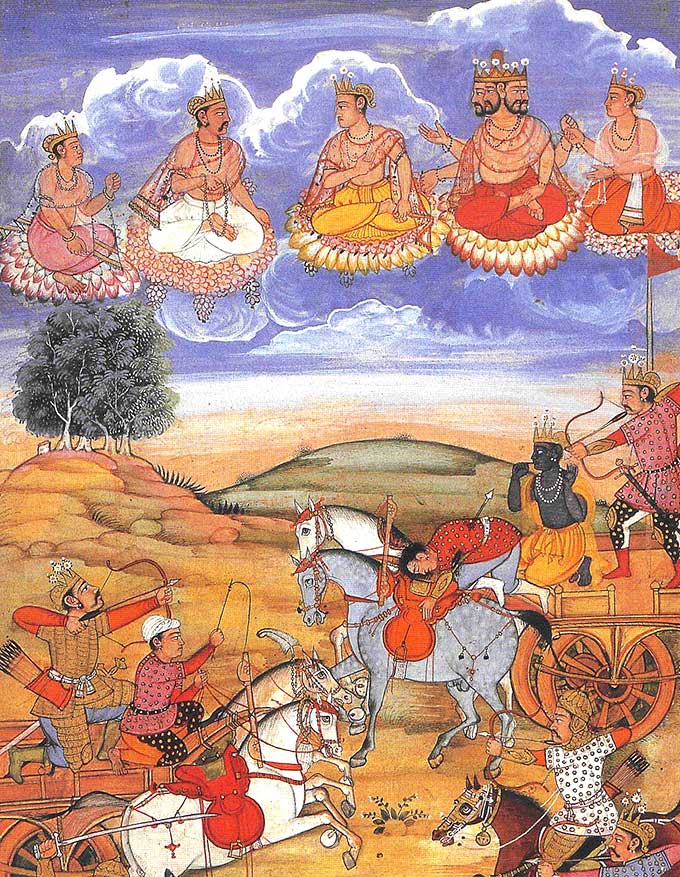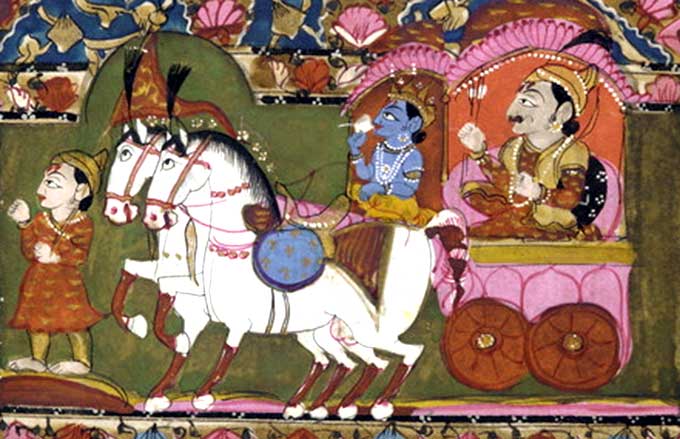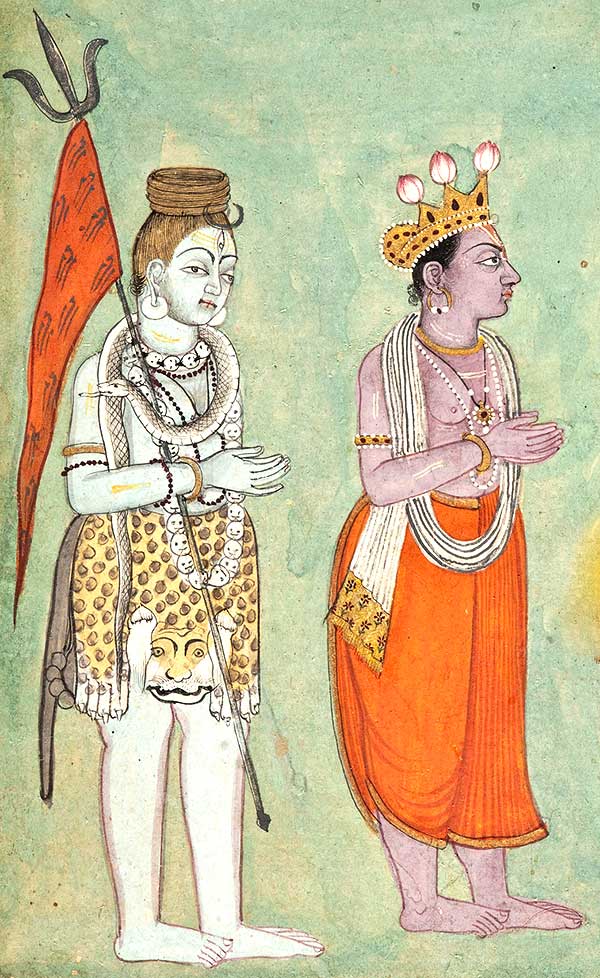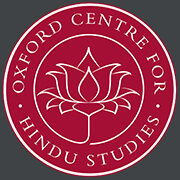Bhagavad Gītā Chapters 1–6:
The Path of Action

This course provides an in-depth exploration of the Bhagavad-gītā’s first six chapters, exploring its philosophical depth and poetic beauty.
We examine the Gītā’s context within the Mahābhārata and the core teachings on karma-yoga (selfless action), meditation, and the eternal self.
Through Arjuna’s inner conflict and Kṛṣṇa’s guidance, we learn how spiritual wisdom applies to real-life dilemmas. The course combines philosophical insight, practical meditation techniques, and discussion of historical interpretations.
Learning Outcomes
- Understand the Gītā’s structure and context.
- Recognise the Gītā’s place in Indian thought.
- Understand key themes: karma-yoga, dharma, meditation, and the soul.
- Understand the transition from action to meditation.
- Analyse philosophical perspectives from leading commentators including Śaṅkara and Rāmānuja.
- Cultivate tools for self-mastery, resilience, and spiritual growth.
Start Date: 27 July 2025
Late enrolments still open for a limited time
Course Duration: Eight Weeks
218pp
On-Demand Video
The main video component of your course. On-demand means you can watch at the time that suits you.
7hr 20min
Campus-wide Zoom sessions
These free Zoom sessions are not part of your main course materials. They are open to students enrolled in any course.
Explore other areas of Hindu studies! Meet tutors and students from other courses!
Monday 4 August 12noon
Tuesday 12 August 2pm
Wednesday 20 August 3pm
Thursday 28 August 5pm
Sunday 7 September 6pm
These are all UK times. Recordings are available for any sessions you miss
Bhagavad Gītā Chapters 1–6: The Path of Action
Self, Duty, and the Path of Action
Introduction: Bhagavad gītā and Its Context in the Mahābhārata
We set the stage for a close, verse-by-verse study of Bhagavad gītā Chapters 1–6. We examine the Gītā’s place in the Mahābhārata, outline key themes like karma-yoga and meditation, and introduce influential commentators such as Śaṅkara and Rāmānuja. The aim here is to reveal the text’s philosophical richness and multiple layers of meaning, inviting personal contemplation and deeper understanding. Download the introductory chapter.
Session 1: The Battlefield Dilemma (Chapter 1)
This session introduces Chapter 1 of the Bhagavad-gītā. As the warrior-prince Arjuna faces the prospect of battling his own family, he is overcome doubt, raising deep questions about duty, morality, and the costs of conflict. We see how these themes connect the Gītā to broader issues, and how Arjuna’s struggle prepares the way for Kṛṣṇa’s transformative guidance in later chapters.

Session 2: The Nature of the Self and Duty (Chapter 2, Part 1)
Kṛṣṇa responds to Arjuna’s reluctance to fight by addressing themes of compassion, and duty. Kṛṣṇa teaches about the eternal nature of the self, explaining why Arjuna should not grieve for those who must die in battle. This section sets up the crucial distinction between body and soul, preparing Arjuna (and us) for the practical spiritual guidance that follows later in the Gītā.
Session 3: Detachment and the Path of Knowledge (Chapter 2, Part 2)
This session explores the second half of Chapter 2, focusing on karma-yoga: acting without selfish desire. Kṛṣṇa explains how to maintain inner balance amidst life’s dualities, introducing the ideal of selfless action. We also discuss criticisms of ritualism and the qualities of a truly enlightened person.
By focusing the intellect in this way (buddhi-yukto), one sets aside both righteous and unrighteous deeds. Therefore, engage yourself in this yoga, for yoga is the true art of performing action
Bhagavad gītā 2.50
Session 4: Karma-Yoga: The Yoga of Action (Chapter 3)
This session further explores karma-yoga. Arjuna questions the balance between wisdom and action, and Kṛṣṇa clarifies that everyone must act, even the wise. The importance of performing one’s duty without attachment is emphasised, as is the role of desire.
Session 5: The Supreme Knowledge (Chapter 4)
Chapter 4 introduces Kṛṣṇa’s divine identity and the ancient origins of karma-yoga. Kṛṣṇa shares the doctrine of avatāra (his descent to restore dharma). The session covers how true renunciation and spiritual knowledge lead to selfless action, and how the Gītā’s vision of sacrifice expands beyond ritual to spiritual practice.
When action is given over to the practice of yoga, when doubts are destroyed by knowledge, and when the mind is brought under control, a person’s actions cannot bind them.
Bhagavad gītā 4.41
Session 6: Renunciation and the Wise Person (Chapter 5)
We now turn to Chapter 5, where Arjuna asks which is superior: action or renunciation? Kṛṣṇa explains that both can lead to spiritual success, but karma-yoga – acting selflessly without attachment – is preferable and more practical. The discussion also examines the relationship between philosophical knowledge (Sāṁkhya) and the practice of yoga, stressing that wisdom and action should work together. The session concludes by highlighting the state of the true renunciant: inner tranquility and freedom from worldly attachments.
Session 7: Dhyāna-Yoga: The Yoga of Meditation (Chapter 6, Part 1)
Kṛṣṇa outlines practical methods for meditation, drawing parallels with Patañjali’s Yoga Sūtras, and emphasises that inner renunciation and mental discipline are key. By mastering the mind and senses, the yogi achieves tranquility and self-realisation, experiencing a state of lasting happiness and liberation.
Session 8: Arjuna’s Doubts, Kṛṣṇa’s Reassurance, Bhakti (Chapter 6, Part 2)
In this final session, Arjuna expresses doubts about mastering meditation. Kṛṣṇa reassures him that, while difficult, success comes with steady practice and determination. The discussion emphasises that effort on the yogic path is never wasted, and everyone making sincere progress will eventually reach spiritual fulfilment.
Your Tutor

Dr Nick Sutton
Nick is the Director – and the heart and soul – of the OCHS Continuing Education Department. He is a dedicated teacher with decades of experience in making sometimes-confusing traditions relevant. He has created over a dozen online courses and is working on many more. He has written translations and commentary on Bhagavad Gītā and the Yoga Sūtra. Nick received his Phd from Lancaster University (1995). His thesis was on the religious teachings of the Mahabharata.






